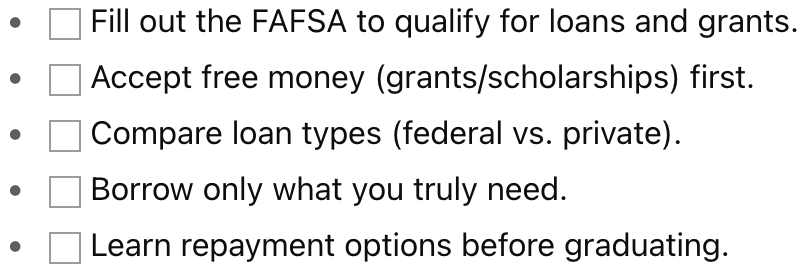College is expensive, and most students need financial help.
Understanding the difference between loans and grants, and how they compare to other types of debt, will save you money and stress down the road.
💰 What Are Student Loans?
- Borrowed money you must pay back with interest.
- Offered by the federal government or private lenders.
- Payments usually begin after graduation (but interest may start right away, depending on the loan type).
Types of Student Loans:
- Federal Loans:
- Usually lower interest rates.
- Options for income-based repayment.
- Some qualify for forgiveness programs.
- Private Loans:
- From banks or lenders.
- Higher rates, fewer protections.
- Often require a co-signer.
🎁 What Are Grants?
- Free money (you don’t have to pay it back).
- Based on financial need, merit, or special qualifications.
- Common source: Pell Grants (federal), plus state and school grants.
👉 Pro tip: Always apply for grants and scholarships first before borrowing loans.
🔄 How Student Loans Differ from Other Debt
| Factor | Student Loans | Credit Cards | Mortgages |
|---|---|---|---|
| Purpose | Education | Everyday spending | Buying a home |
| Collateral | None | None | House (can be foreclosed) |
| Interest Rates | Moderate (4–8% federal, higher private) | High (15–25% or more) | Lower (5–7% on average) |
| Repayment | Starts after school, flexible plans | Immediate, high minimums | Long-term, fixed monthly payment |
| Forgiveness | Possible (Public Service Loan Forgiveness, etc.) | None | None |
🛠️ Managing Student Loans Wisely
- Borrow only what you need — don’t treat loans like free money.
- Understand interest: Unsubsidized loans accrue interest while you’re in school.
- Explore repayment plans — income-driven plans can make payments affordable.
- Consider extra payments when you can — even small amounts save interest long-term.
- Keep track of deadlines — missing payments damages your credit.
✅ Quick Checklist

🔑 Key Takeaway
Grants = free money. Loans = debt.
Use grants and scholarships whenever possible, and treat loans like a serious commitment. Understanding how they differ from credit cards and mortgages will help you avoid financial traps later.

